A level results 2025
Key headlines
- 31.3% of A levels taken by girls are in core-STEM subjects, highlighting an increased participation of girls across core-STEM subjects, with only A level Biology seeing a decrease.
- Mathematics remains the most popular A level continuing to grow with more than 110,000 entries this year. There has been a 21.7% increase in entries in the last 10 years.
- Computing A level continues to grow with female participation up from 17.5% to 18.6%.
- Physics continues to grow in popularity, now the sixth most popular subject amongst A levels (up from ninth last year).
- Environmental science has been reported on individually for the first time as entries exceed 2,000 for the second year.
Overview of core-STEM A levels
The number of girls participating in core-STEM subjects has remained stable. Whilst participation has increased by 1.7%, the overall representation of girls stays at 42.8%.
Overall, more girls are participating across the core-STEM subjects, with A level Biology seeing the only decline in participation for the second year running. Nearly one third (31.3%) of A levels achieved by girls in 2025 were in core-STEM subjects.
Whilst the increased uptake of core-STEM A levels is positive, there is still a disproportionate representation amongst male and females. Nearly half (48.9%) of all A levels for males are in core-STEM subjects. This is another yearly increase, highlighting the prioritisation of core-STEM subjects amongst boys.
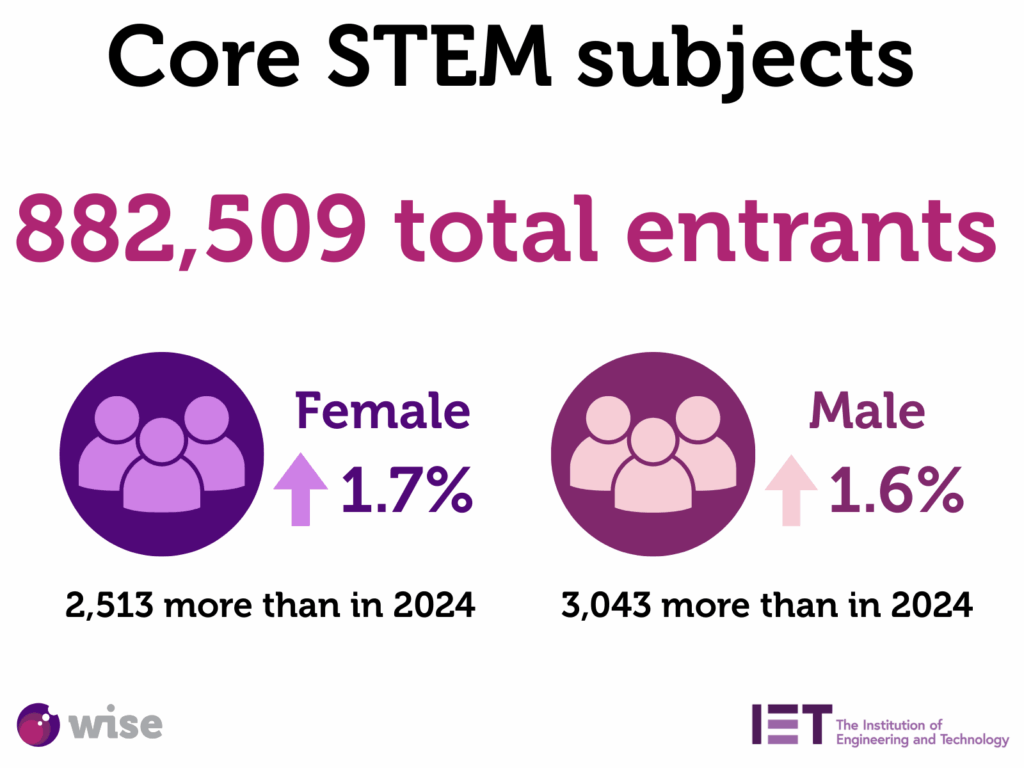
Computing A level
Computing A level continues to grow amongst female participation. Whilst we see a less steep increase in uptake than we did in 2024, it is still moving in the right direction with 18.6% of entrants this year being female.
Interestingly Computing A level was one of the few core-STEM subjects that saw a decline in male participation – dropping by 4.1% this year.
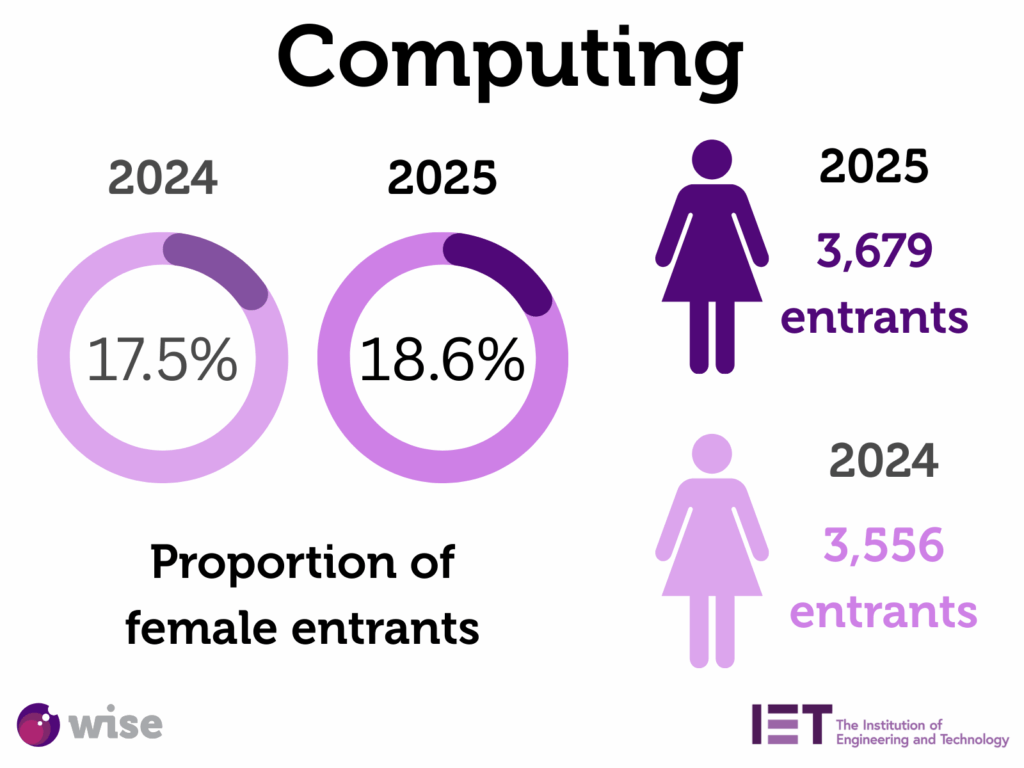
Although small steps, we’re pleased to see the continued growth of Computing amongst women and how this is translating into a higher uptake within higher education.
Science A levels – biology, chemistry, physics and environmental science.
Biology A level remains the most popular science subject amongst young people, however there has been a significant decline in the number of entries for both girls and boys this year. Due to a 6.1% decrease in male entrants, the overall cohort is now 64.4% girls (up from 63.5% in 2024).
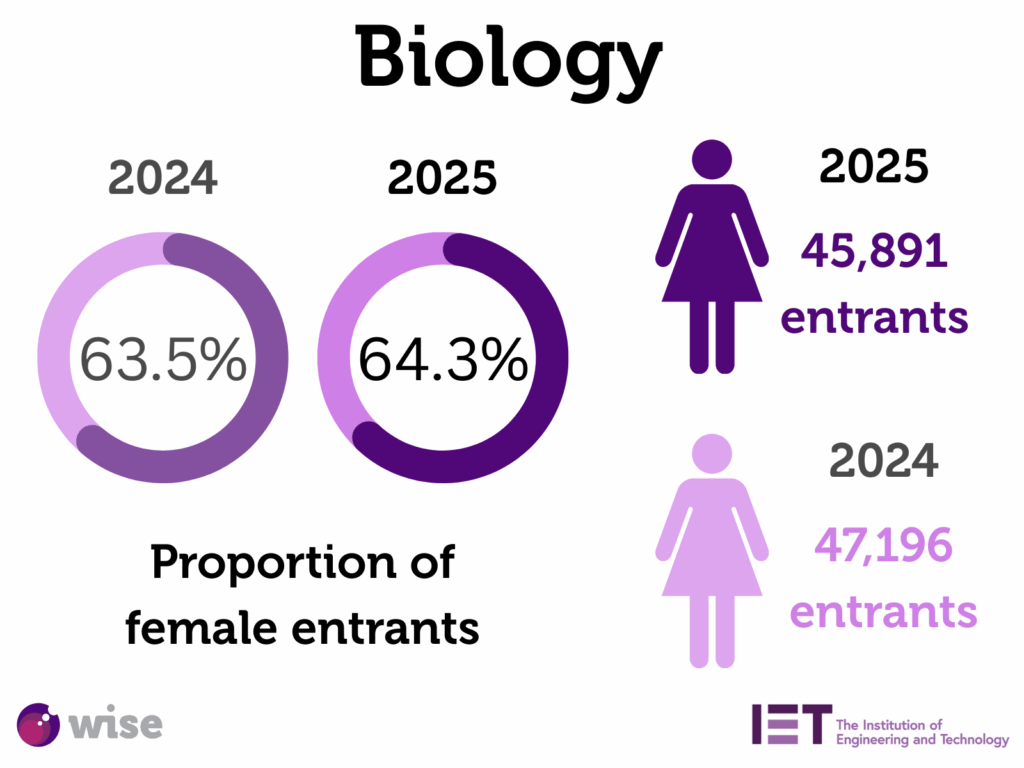
Biology remains the third most popular A level amongst students with chemistry still in fourth and physics celebrating an increase as it jumps up three places to be this year’s sixth most popular A level.
Chemistry A level
Chemistry A level has remained largely stable for the last few years. Due to an increased popularity amongst boys this year the proportion of girls drops slightly to 56%, highlighting a distinct popularity amongst girls that is much higher than the overall average for female participation in core-STEM subjects.
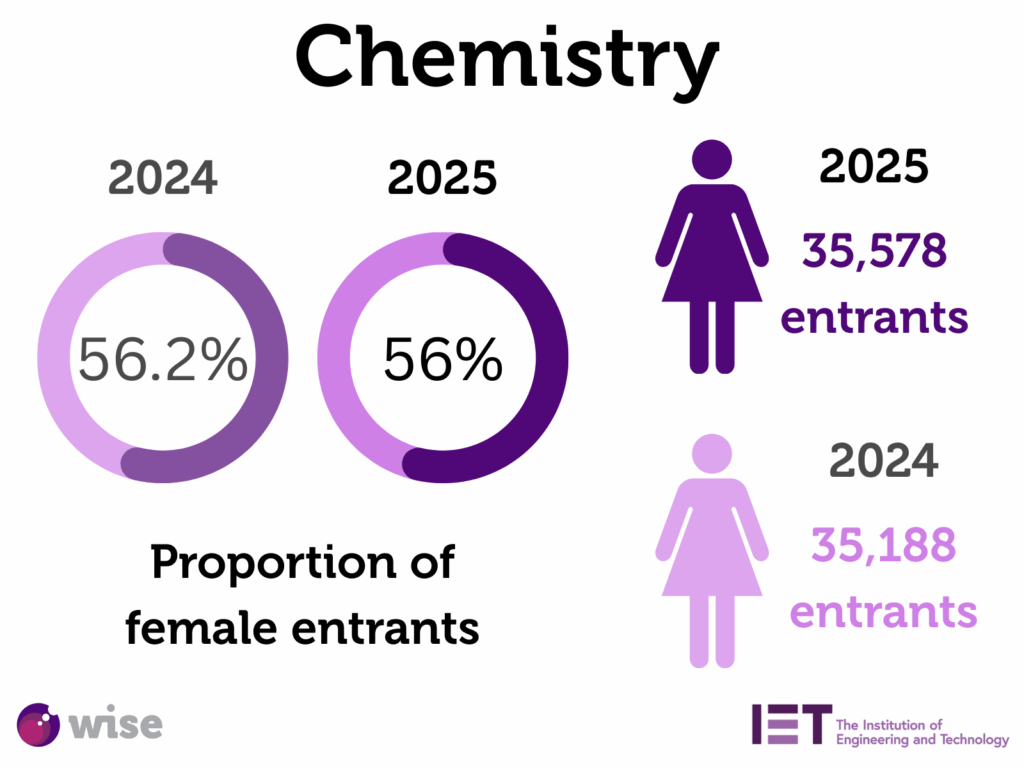
Physics A level
Physics A level continues to grow with nearly 45,000 entries this year. Participation amongst girls is up 7.9% with the overall cohort being 24.1% female this year. Overall entries into Physics A level is at an all time high after seeing fluctuation in recent years.
Whilst it is the sixth most popular subject this year, physics still lags behind biology and chemistry significantly, especially amongst girls.
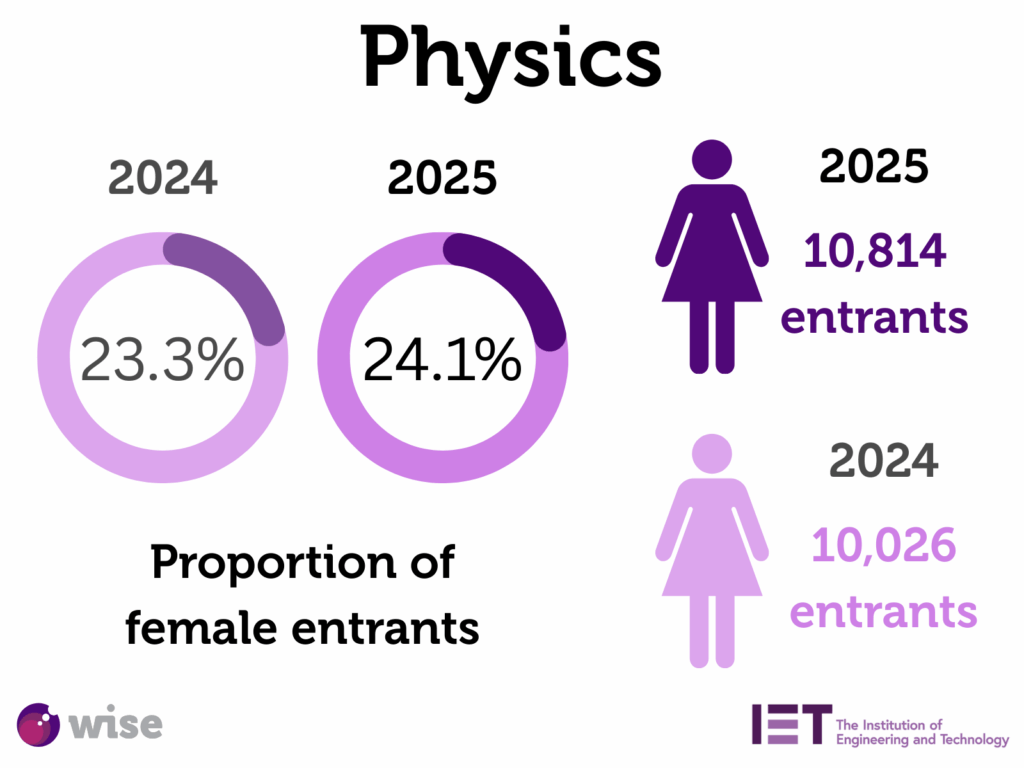
Environmental Science A level
For the first time this year, JCQ has reported on Environmental Science A level as entries surpass 2,000 for the second year running. This is due to a 15.7% increase in female uptake and an 8.8% increase in male uptake.
Whilst numbers are still low compared to other science subjects, Environmental Science A level celebrates gender parity with 50.1% participation amongst girls.
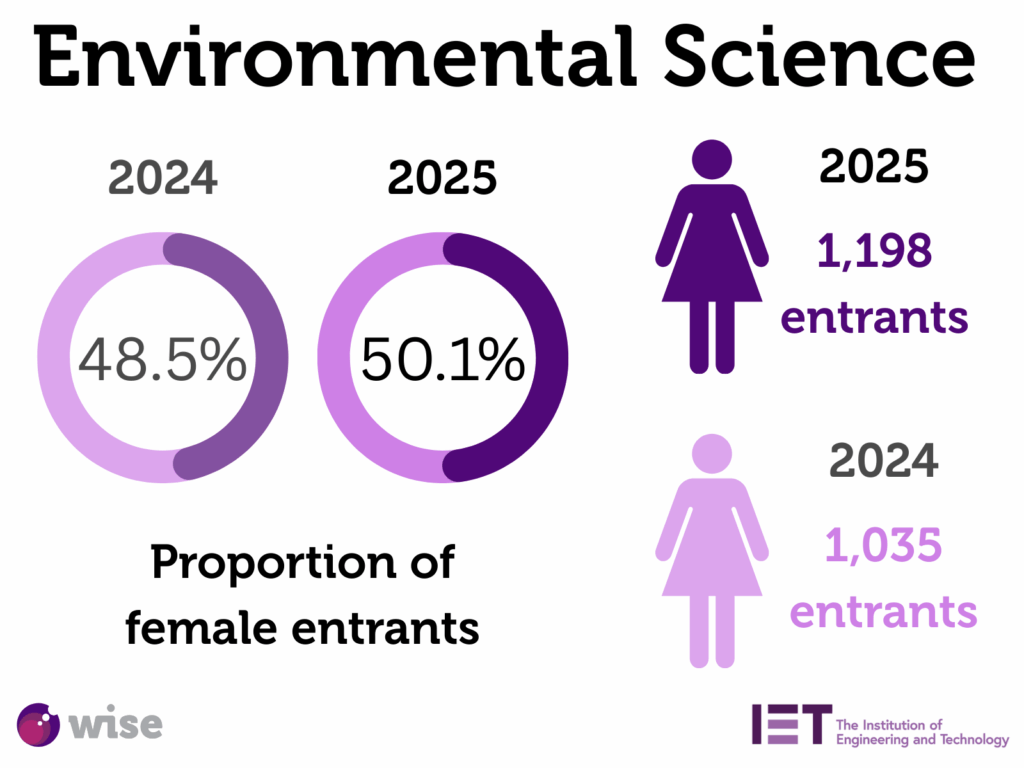
Mathematics A level and Further Mathematics A level
Mathematics continues to be the most popular A level amongst young people, with more than 112,000 entries this year. Positively female participation continues to grow with entries reaching over 40,000 for the first time (41,883 female entries in 2025). This is a 4.9% increase in female participation and slightly increases the overall female participation to 37.3%. This however is still down from 37.7% in 2023.
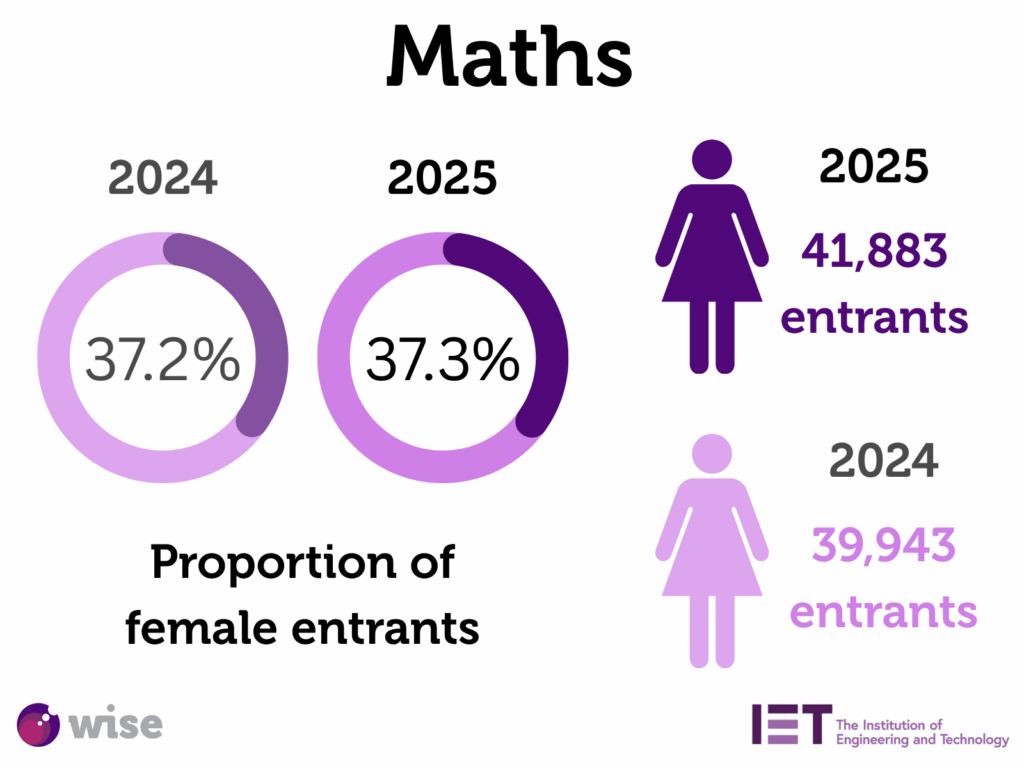
After seeing a huge rise in the number of entries to Further Maths last year, the numbers have remained stable in 2025 with increased participation amongst girls and boys. Due to a larger increase in male participation, the overall female representation has dipped just below 27% (26.9% in 2025 compared to 27.1% in 2024).
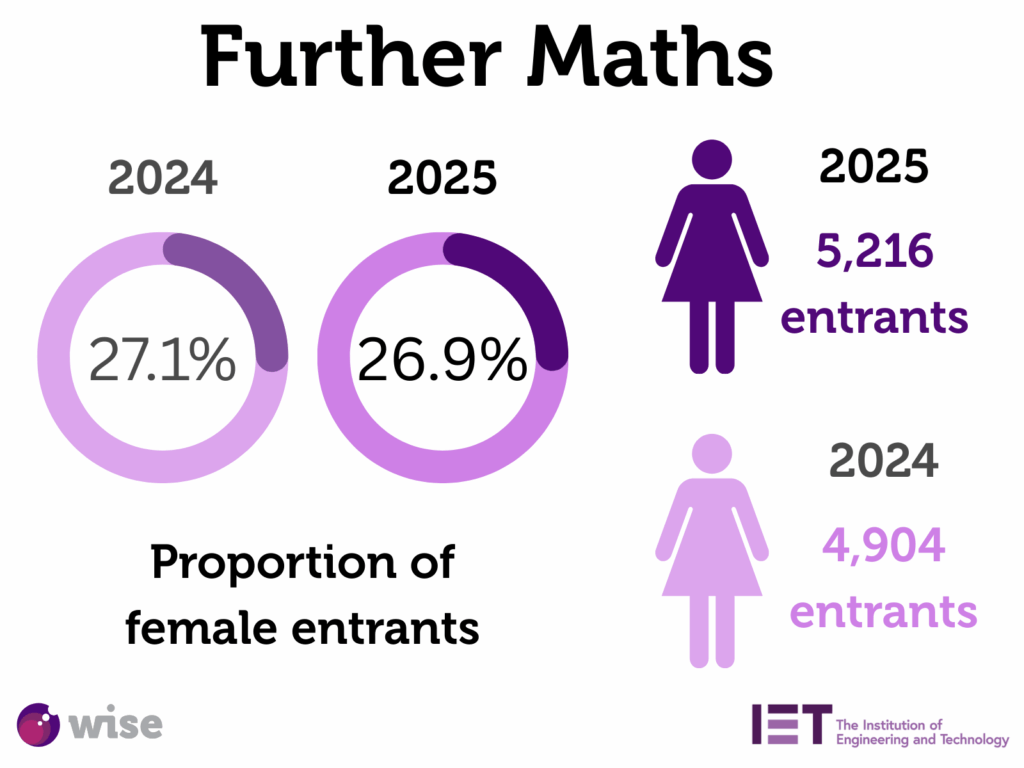
Other core-STEM A levels
Design and Technology A level continues to see steady growth with female participation up to 32.7% from 31.8% in 2024.
Whilst still a relatively new subject, Digital Technology A level saw a marginal decrease in entries this year. However, overall female participation increased from 26.7% in 2024 to 27.7% in 2025.
The number of entries to Other sciences remained stable, although a slight drop in female participation can be seen, now at 26.9% down from 37.8% in 2024. This is largely due to Environmental Science A level being categorised individually for the first time.
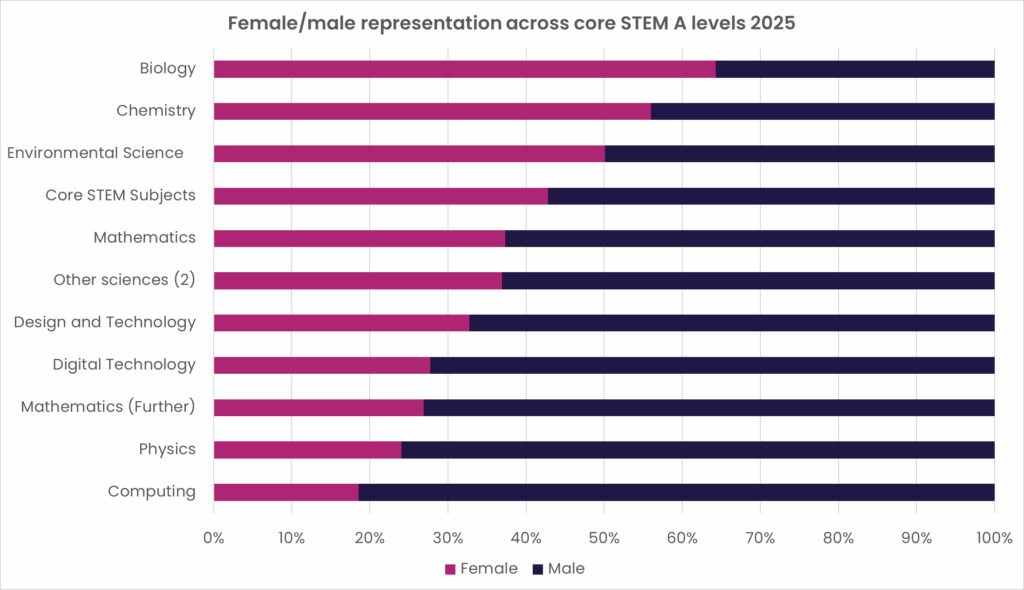
Scottish results
In last week’s results in Scotland, Maths topped the charts with 4,460 Advanced Higher entries, followed by Biology at 3,125. In STEM, female representation sits at 47%, with high entries in Biology (69%) and Chemistry (60%). The numbers for girls drop in Engineering Science (17%) and Computing (20%), spotlighting some gender imbalances in line with what we’re seeing in today’s A level results.
Dr Laura Norton, Head of Equity, Diversity and Inclusion at the Institution of Engineering and Technology and Managing Director of WISE, said: “It’s encouraging to see more girls choosing STEM subjects overall, but gender gaps persist – especially in Maths, Physics and Computing. This reflects long-standing differences in how boys and girls perceive engineering careers.”
“To close these gaps, we must challenge outdated stereotypes and spotlight diverse role models. Girls need to see that engineering is for them too – and that starts with visibility and access to all pathways, from school through to industry.”
“Role models matter – and celebrating women engineers is key to inspiring the next generation. Resources like WISE’s My Skills My Life platform are vital in showcasing the breadth of opportunities and people in STEM.”
About WISE
At WISE, our purpose is to enable the STEM sector to create workplaces where women are fully represented, supported and empowered to thrive. We believe in the power of collaboration to ensure STEM is an inclusive and representative sector for all. We believe when diversity of thought is embraced, innovation thrives, and we can bridge the skills gap to drive progress across the sector.
Find out more about how you can work with WISE on our website.
A press release has been published by the Institution of Engineering and Technology, which WISE is a subsidiary of. Working together on today’s results’ insight, please visit the IET’s media hub to read this: Press releases 2025 (July – September). For press enquiries, please contact Rebecca Gillick, External Communications & PR Lead via rgillick@theiet.org.
Footnote
Core-STEM A level subjects include Biology, Chemistry, Computing, Design and Technology, Digital Technology, Environmental Science, Mathematics, Mathematics (Further), Physics and Other Sciences.
